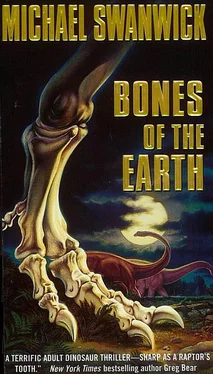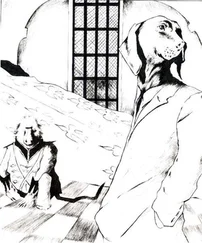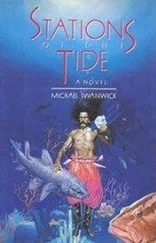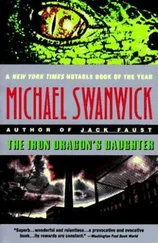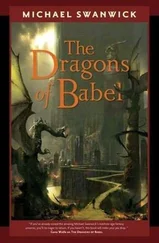“Geddoff!” he yelled.
Toothbirds were enantiornithiforms the size of crows. Having an angry one on his chest was terrifying.
He swatted at the little horror, and it dug in its claws and jabbed at him with its beak.
“Get it off of me! Get it off!”
He was running, blindly, not caring where.
Chuck was running too, and stumbling, using his hat to try to ward off the creature. It flew in tight angry loops between him and Tamara, aiming always at their heads, their eyes. She plunged ignominiously through the bushes at the edge of the clearing, and disappeared.
Then Leyster too found himself immersed in the gloom of the deep woods. The archaeopterygian launched itself into the air. It flew angrily back to its young, screeching threats over its shoulder.
Leyster straightened warily. He looked around, and saw his friends shamefacedly approaching. Chuck shrugged, and grinned sheepishly.
“Well,” Tamara said. “We didn’t exactly cover ourselves with glory this time.”
“This one definitely doesn’t go in the autobiography,” Chuck agreed. “You okay?”
“Yeah, fine.” He’d been bitten on both of his hands and on one cheek. The bites ached like blazes. “Only, I think maybe we should go around this particular clearing.”
Toothbirds rarely nested alone. There might be dozens of nesting pairs further in.
“Let’s get those wounds bandaged up,” Tamara said, digging out her water bottle and eying a nasty-looking gash on Chuck’s forehead. “Before the smell of blood draws something really mean.”
Leyster nodded. From where they stood, they could still see the meadow, bright in the sun and framed by shadows, like a Victorian oil painting of the Garden of Eden, and like the Garden of Eden a place to which they could not return. How much did a toothbird weigh? Maybe nine ounces? It was a sobering thing to contemplate in a world containing predators weighing eight tons and more.
Though he said nothing, he was beginning to wonder if maybe this trek wasn’t going to be quite as easy as they had all confidently predicted.
Terminal City: Telezoic era. Eognotic period. Afrasia epoch. Orogenian age. 50 My C.E.
From a distance, Terminal City was mesmerizing. Molly Gerhard had once been to Petra, the “rose-red city half as old as time,” on a Bible Lands tour. She’d thought then that nothing could be more magical than those columned façades carved from the mountainside, those graceful roofs hewn from solid stone.
She’d been wrong.
Watching the cold Aegean tumble through the narrow cleft between the golden halves of Terminal City while the afternoon light played across the fractured strata of its surface filled her with the same bewildered sense of wonder that an infant feels on first seeing a Mylar balloon. It took the breath away. When she closed her eyes, the river and mountains disappeared but the City remained, burned into her memory forever.
That was the outside. The inside, however…
The inside had all the charm of a badly-lit warehouse. The Unchanging scurried like Medieval monks through twisting corridors so murky that Molly Gerhard was continually being startled when one suddenly loomed up, silent and grim, out of the darkness. There were no signs or directions anywhere in this drab labyrinth. The Unchanging knew where to go without them.
It was her job to make sense of it, though. So she had. She had mentally mapped out the main corridors well enough, anyway, to lead Dr. Salley where she wanted to go. The paleontologist, she noted, was in an even worse mood than she had been an hour ago.
“Why are we doing this?” she asked.
“Because I asked you to,” Salley said.
“Why did you ask me to?”
“Because I have something to show you.”
“What?”
“You’ll see when we get there.” Salley flashed her a bright, malicious glance. Something had filled her with energy and purpose. Molly Gerhard assumed it was somehow related to her problems with Griffin.
Whatever the source, she was a bitch on wheels today.
Waving a hand at the gray, unornamented walls, Salley resumed an earlier monolog: “All this I understand. It’s as plain as the interior of a wasp’s nest, and as functional too. Nothing but what’s needed. The inside is everything it ought to be. What baffles me is why the exterior is covered with gold.” She spoke the final word with distaste, as if the conventional beauty of the substance offended her esthetic sense.
“I think—”
“Please don’t.” Salley strode straight ahead, trailing a hand lightly against the passing wall.
To Molly Gerhard’s uneducated eye the walls looked to be concrete. But, no, Salley had said, they were made of fine-grained coral, most likely grown in slabs for that exact purpose. They passed open doorways through which might be glimpsed a Victorian fernery, or a barrel-vaulted hall crammed with subway cars and garden gnomes, or perhaps one holding endless rows of filing cabinets whose opened drawers would reveal thousands of neatly-organized salad forks. She knew because Salley darted in and opened several.
It was easily the strangest structure Molly Gerhard had ever been in, less a city than some mad collector’s wet dream of a private museum.
“I think,” she repeated, “that there could well be a functional purpose for the gold.” Her father was an electrical engineer, and she had inherited much of her logical sense from him. “Gold is an excellent conductor. The river flowing through the city must set up an enormous static charge. Maybe the entire structure acts as a passive electric generator. If so, they could get all the energy they needed, just by tapping the shell.”
“Huh,” Salley said flatly. “Fancy that. You’re not as brain-dead as you look.”
Molly Gerhard bit her tongue. Salley knew something. She was determined to find out what.
Five Unchanging passed them without word or a glance. One held a large red fungus in a bell jar. Another cradled a piece of Etruscan sculpture in its arms. Two more effortlessly carried a red-and-white Indian motorcycle between them—a 1946 Chief, by the looks of it. The last held a mahogany-and-brass gramophone. Nothing she ever saw came from her future. There were systems in place, they’d been assured, to prevent that from happening.
Salley sniffed loudly as the Unchanging passed. “Smell that?”
“I don’t smell anything.”
“Exactly.”
“All right, dear,” Molly Gerhard said, “I give up. You win. I’m not as smart as you are, I admit it.” She felt an urge to slap the woman. “This I-know-a-secret act is getting old. Why don’t you just tell me what you’re trying to say?”
“The data are laid out before you,” Salley said complacently. “The rest is left as an exercise for the student.”
The corridor twisted and then split in two. Thinking murderous thoughts, Molly Gerhard chose the wider corridor, leading downward.
* * *
The deeper they went, the more Unchanging they saw. They were as indistinguishable as worker bees. All were clad in identical robes, like those worn by Buddhist monks, but white rather than orange. In the dim light, they seemed to glow.
“They do look extraordinarily like people, don’t they?” Salley said abruptly.
“Um… yes. Of course.” She had been thinking that they looked as beautiful and impersonal as angels. Griffin, who was raised a Catholic, had made that comparison. Molly was a Baptist, however. She thought the Unchanging were creepy. Their lack of suspicion annoyed her. They were all patience and predetermination. So far as she could tell, they had no curiosity whatsoever. “I mean, they must be mammals, right? They’re obviously related to people. Somehow.” She hesitated. “Aren’t they?”
Читать дальше
